Risk
The CALP Network’s State of the World’s Cash report found that the perception that CVA is riskier than other forms of aid was one of the main barriers to CVA being routinely used. This concern is linked to the growing emphasis from donors on anti-terrorism and money laundering, and shrinking budgets for humanitarian assistance. The CALP Network’s work under this theme aims to debunk myths, facilitate collaboration, and share learning to ensure that CVA is systematically and equally considered, based on evidence of actual risks across modalities.
Current priorities
A variety of organisations are currently working on CVA and risk. The CALP Network is working to identify synergies among actors, avoid duplication, and define joint priorities that can be better addressed collectively. Together with WFP, the CALP Network is co-leading the risk priority within the Grand Bargain workstream on cash.
Featured content

Podcast: Will risk aversion hold us back from realizing the potential of CVA?
Podcast
Episode 1 of the CashCast, exploring how attitudes to risk have impacted the use of CVA in the Middle East and North Africa region.

CVA and Risks: What happens in the field, stays in the field?
Blog Post
In October 2019 in Douala, Cameroon, the CALP Network facilitated a learning event exploring the risks to beneficiary protection in Cash and Voucher Assistance (CVA). This closed-door workshop, held as part of series of meetings and webinars on theme of CVA and risk in different regions, convened 25 humanitarian workers from West and Central Africa representing local and international NGOs, UN...

Webinar: Data sharing in CVA: ethics, ownership and privacy
Event
Thematic lead
Latest

DG ECHO Thematic Policy Document on Cash Transfers
Policy paper
DG ECHO released its Thematic Policy document on Cash Transfers in March 2022. The document provides guidance primarily to DG ECHO’s partners and staff, but also to the wider cash community with the objective of collectively enhancing the quality and efficiency of cash programmes and of humanitarian...
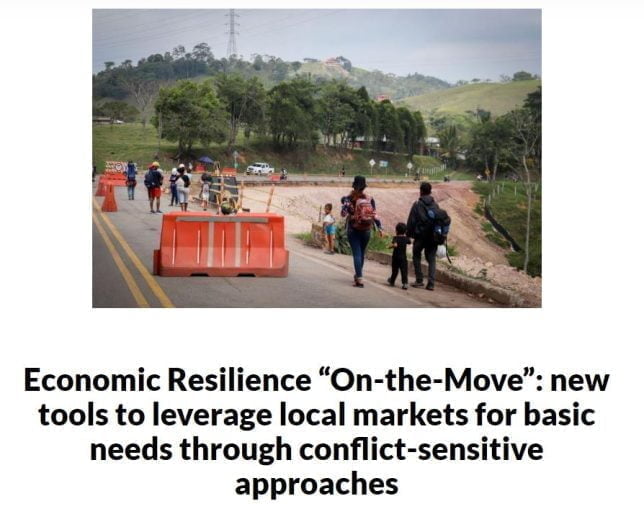
Economic Resilience “On-the-Move” – New Tools to leverage local markets for basic needs through conflict-sensitive approaches
Guidelines and Tools
See the publication here A special look at Cash and Local Markets for Social Cohesion Local market actors affected by (natural) disasters, pandemic lockdowns with movement restrictions and income loss – generally in Fragile Contexts – play a critical role in contributing towards communities’ basic...
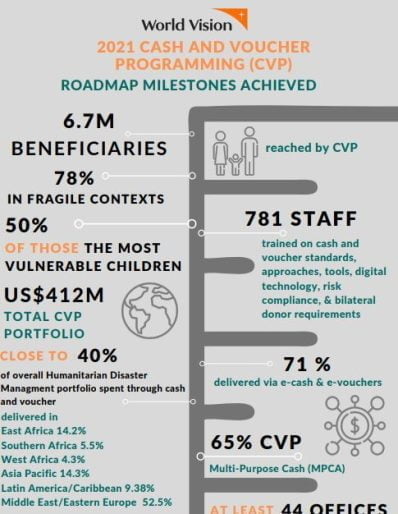
2021 Cash And Voucher Programming (CVP) Roadmap Milestones Achieved
Report
Summary Report of World Vision’s global progress report and milestones (against WV’s global Cash Roadmap Strategy) in Cash Voucher Assistance (Cash Voucher Programming-CVP) facilitated by World Vision in over 44 countries, reaching more than 6.7 Mio vulnerable people (78 % in Fragile Contexts) in...

Field Handbook for Rental Housing Market Assessment – Latin America and the Caribbean
Guidelines and Tools
The International Federation of the Red Cross (IFRC), the Norwegian Refugee Council (NRC), the International Organization for Migration (IOM), the United Nations High Commissioner for Refugees (UNHCR) and REACH with the support of CashCap/NORCAP and the collaboration of the R4V Shelter Sector, established...
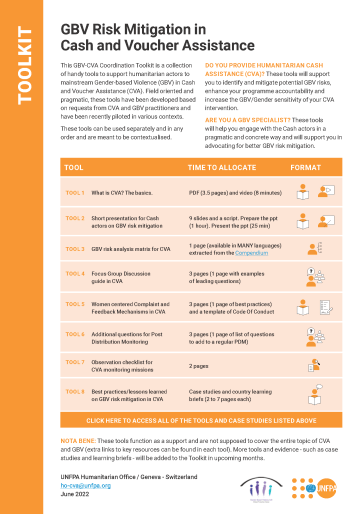
GBV Risk Mitigation in Cash and Voucher Assistance
Guidelines and Tools
This GBV-CVA Coordination Toolkit is a collection of handy tools to support humanitarian actors to mainstream gender-based violence (GBV) in cash and voucher assistance (CVA). Field oriented and pragmatic, these tools have been developed based on requests from CVA and GBV practitioners and have been...
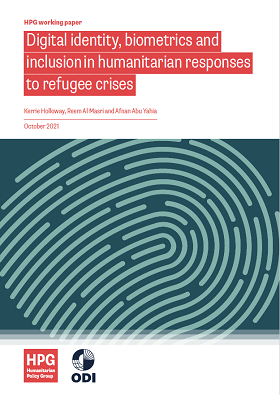
Digital identity, biometrics and inclusion in humanitarian responses to refugee crises
Report
Digital identity and biometrics have long been divisive topics in the humanitarian sector. On the one hand, they have the potential to be more inclusive and reach people in need at scale due to perceived efficiency gains. A legal identity for everyone as part of the Sustainable Development Goals (SDGs)...
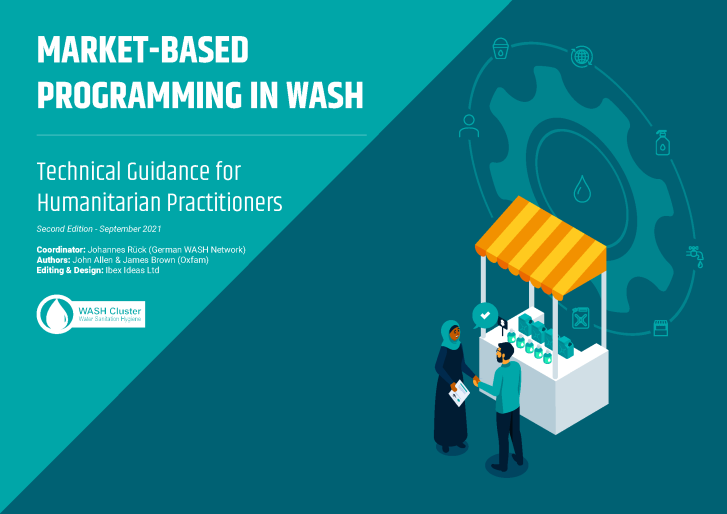
Market-Based Programming in Wash – Technical guidance for humanitarian practitioners
Guidelines and Tools
The purpose of this document is to provide practical guidance on market-based programming (MBP) in humanitarian WASH responses. This guidance is intended for: Humanitarian WASH practitioners Cash and markets practitioners Humanitarian business support teams supporting WASH programmes WASH Cluster/Sector...

Guidelines on Using Cash and Voucher Assistance for Sexual and Reproductive Health and Rights Programming
Guidelines and Tools
CARE seeks to increase its use of CVA for one of its core areas of programming, Sexual and Reproductive Health and Rights (SRHR). This is in line with the recommendations of the Inter-Agency Working Group on Reproductive Health, which deems CVA a suitable option to ensure ongoing access to affordable and...
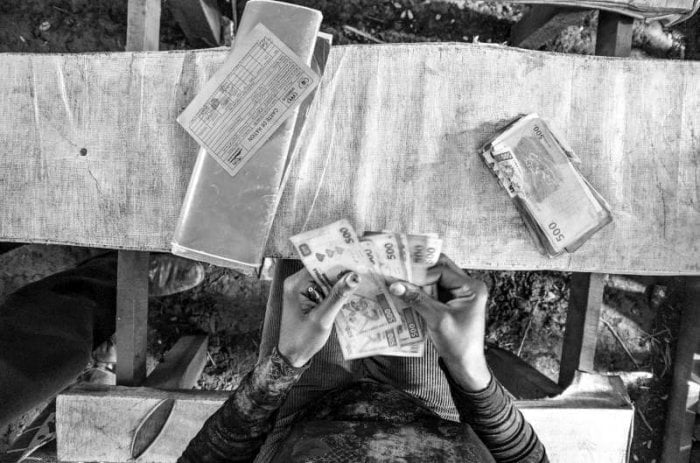
Screening recipients of humanitarian cash and voucher assistance: necessary precaution or wasted resources?
Blog Post
Is screening the recipients of humanitarian cash and voucher assistance an effective way to mitigate against the perceived diversion risk that cash represents? If yes, how? If not, why are conversations growing on the topic? In a recent report for Oxfam and Bond, Nina Newhouse & colleagues from the London...

Cash and Voucher Assistance (CVA) Feasibility and Risk Analysis Sudan
Case Study
Summary findings UN agencies and NGOs are all in the process of starting up or scaling up cash transfers with many other agencies active in the Cash Working Group while WFP is considered as the biggest Cash actor. There is a strong direction from the government at the national level to use cash based...

GBV Risk Mitigation: An Analysis of the CARE Somalia Integrated Relief &Recovery Program (ISRP) Multipurpose Cash.
Report
This is a learning brief that highlights the GBV risk mitigation analysis of CARE’s ISRP Project (Economic Recovery Sector ) funded by USAID’s Bureau for Humanitarian Assistance (BHA), The CARE Project was applied as one of the case studies for the inter-agency Somalia GBV Risk mapping in CVA projects.
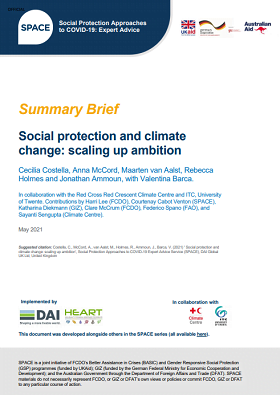
SPACE Social protection and climate change: scaling up ambition (Summary Brief)
Policy paper
Climate change, once perceived as a long-term environmental issue, is now an immediate threat to safety and prosperity, especially for the most vulnerable people that are hit hardest by increasing weather extremes. The impacts cannot be managed just by reducing greenhouse gas emissions or by small tweaks...
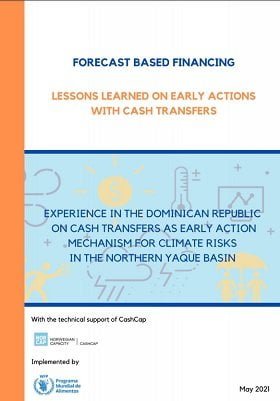
Forecast based financing – lessons learned on early actions with cash transfers
Report
The objective of the document is to present the lessons learned related to the implementation of early actions with cash transfers as part of the forecast-based financing mechanism implemented by the World Food Programme in the Yaque del Norte watershed in the Dominican Republic.
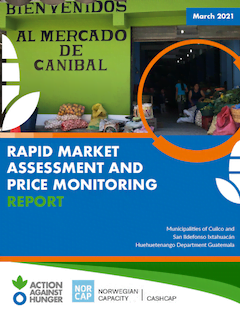
Rapid Market Assessment and Price Monitoring Report – Huehuetenango Department Guatemala
Report
Methodology: This rapid assessment of markets and prices was based on an adapted version of the IFRC’s Rapid Assessment for Markets, elements of the EMMA toolkit’s market system approach and the consortium of NGO’s price monitoring format. The methodology was chosen to give a basic and rapid...
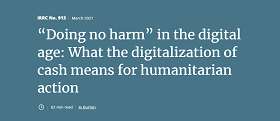
“Doing no harm” in the digital age: What the digitalization of cash means for humanitarian action
Policy paper
Cash transfers have changed the way the humanitarian sector delivers assistance, and at the same time, digitalization is changing the way our world works in fundamental ways. The digitalization of cash means that the simple click of a button can put money in the hands of hundreds of thousands, if not...

Sudan – Gedaref Joint Cash Risk assessment
Report
Since the crisis in the Tigray region of Ethiopia in November 2020 over 60,000 people have sought refuge in neighbouring Sudan and were mostly accommodated in camps re-established in Gedaref State. Cash is has been utilised as a response modality and is being considered further by several agencies. This...

2020 Cash and Voucher Programming (CVP): Roadmap and milestone achieved
Report
In 2020, World Vision has implemented cash and voucher programming like never before – not least due to the COVID-19 pandemic and related social protection transfer scale-ups. From 2019 to 2020, we have seen a 28 % increase of our cash, voucher based programming, moving towards enabling affected...

Towards shock-responsive social protection: lessons from the COVID-19 response in Bangladesh
Report
The COVID-19 crisis is likely to have a staggering impact on poverty in Bangladesh. This report documents the social protection responses by the Government of Bangladesh to mitigate the impact of the pandemic on vulnerable populations. Analysing factors that enabled and constrained the effectiveness of...

Pinning Down Moving Targets: Research Note Medium-term priorities for cash assistance in Lebanon
Report
Whilst most humanitarian responses across the globe have had to navigate the impact of the Coronavirus pandemic, in Lebanon the challenges related to COVID-19 emerged on top of an unprecedented protest movement, political instability, a rapid deterioration of the economy and the increasingly protracted...

CVA for Health Outcomes – Position Paper
Policy paper
The RCRCM CVA for Health Outcomes Technical Working Group Position Paper on Cash for Health Outcomes explores how CVA (a form of demand side financing) can be used to support health outcomes, as a complement to supply side interventions, and highlight some of the key considerations.



